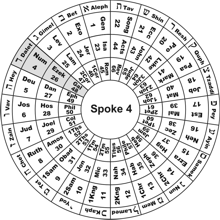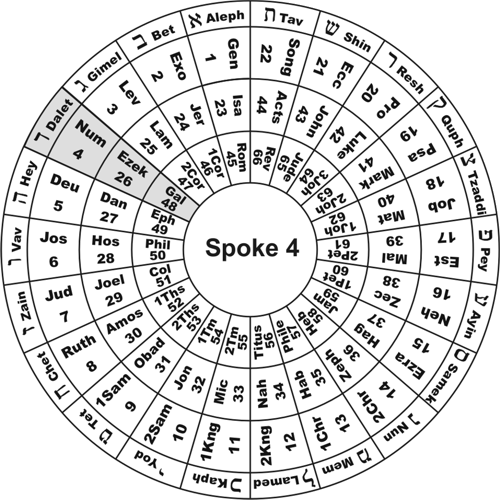Dalet Alphabetic Verses
DALETH. My soul cleaveth unto the dust: quicken thou me according to thy word.
AV Psalm 119:25
The Dust of Death
Immediately after the first sin, God declared that Adam and Eve would die,
saying "dust thou art,
and unto dust thou shalt return." This link between Death and Dust is seen in many
passages of Scripture,
most notably near the Spoke 4 KeyLink between
Isaiah 26 and Ezekiel where God
declares:
Thy dead men shall live, together with my dead body shall they arise.
Awake and sing, ye that dwell in dust: for thy dew is as the dew of herbs,
and the earth shall cast out the dead.
Come, my people, enter thou into thy chambers, and shut thy doors about thee:
hide thyself as it were for a little moment, until the indignation be overpast.
Isaiah 26:19f
 The word translated
as "thy doors", דלתך (Deltikah),
is the plural of דלת (Delet, Door), the name of the Fourth Letter.
On the Inner Wheel of Isaiah, it first appears in Cell 26 in the verse above,
(26 = 42 = Spoke 4, Cycle 2).
This coheres with the distribution of the words Gate(s) and Door(s)
throughout on the Bible Wheel which is greatly maximized on Spoke 4 (cf.
The Door). The theme of Rest, Death, and the Number 4 also
manifest in the Fourth Commandment (Sabbath Rest), the Fourth Seal (Death) and in the
KeyWord דמם (Damam, Rest/Still) which God established in the Dalet
verse of the Alphabetic Psalm 37: The word translated
as "thy doors", דלתך (Deltikah),
is the plural of דלת (Delet, Door), the name of the Fourth Letter.
On the Inner Wheel of Isaiah, it first appears in Cell 26 in the verse above,
(26 = 42 = Spoke 4, Cycle 2).
This coheres with the distribution of the words Gate(s) and Door(s)
throughout on the Bible Wheel which is greatly maximized on Spoke 4 (cf.
The Door). The theme of Rest, Death, and the Number 4 also
manifest in the Fourth Commandment (Sabbath Rest), the Fourth Seal (Death) and in the
KeyWord דמם (Damam, Rest/Still) which God established in the Dalet
verse of the Alphabetic Psalm 37:
- AV Psalm 37.7 [Dalet]: Rest in the LORD, and wait patiently for him:
fret not thyself because of him who
prospereth in his way, because of the man who bringeth wicked devices to pass.
God also used this root in Psalm 4, where we behold the
integration of a whole host of concepts based on the Number 4 and Dalet. And the whole theme
is first established in the Inner Cycle of Genesis where God records the first death in
Genesis 4.
The relation between Dalet, Door, Weakness, and Death originates in the root
דלל (dalal) meaning to hang down, to be pendulous, to swing.
It is closely related to the Tav KeyWord Talah, meaning to hang on a tree or crucify.
The idea is passivity and weakness, like the leaf of a door hanging on its hinges as revealed in
Proverbs 26.14: "As the door turneth upon his hinges, so doth the slothful
upon his bed" (cf. Four Weak and Beggarly Elements). This forms the
basis of the link between Spoek 4 and Spoke 22 based on the Death of Christ (crucifixion, hanging
on the Cross) and manifests in a near KeyLink between Psalms 22 & 44 and the first Dalet
verse of Psalm 119 based on the set (cleaveth, dust) [Verify].

The Number Four represents both an enclosure (four walls)
and expansion (four directions of the
compass) as seen in the image to the right. Both of ideas are deeply integrated with the
fourfold camp of the Book of Numbers (cf.
The Cross in the Wilderness). These dual (polar opposite) concepts are
really just different manifestations of the geometry of the Number 4
(cf. Borders). They are closely related to
the geometric concept of dual tessalations  of the plane.
Christ revealed their innate unity in John 12:24: of the plane.
Christ revealed their innate unity in John 12:24:
Verily, verily, I say unto you, Except a corn of wheat fall into the ground and die [enclosure, grave],
it abideth alone: but if it die, it bringeth forth much fruit [expansion]. He that loveth his life shall
lose it; and he that hateth his life in this world shall keep it unto life eternal.
John 12:24
Death is like a SQUARE (4 = 2 x 2) closing in more and more until
it collapses to a singularity that then opens opens and expands into the limitless expanse
of God's Heaven. The Narrow Gate is narrow only on the way in. It opens unto infinity when you pass through
it!
Devekut: Clinging to the Lord
The actual Dalet KeyWord used in Psalm 119.25 (quoted at the head of this page)
is דבקה (Devkah, Cleave). This word is used in two other Dalet Verses:
Psalm 119.32: I have stuck unto thy testimonies: O LORD, put me not to shame.
Lamentations 4.4: The tongue of the sucking child cleaveth to the roof
of his mouth for thirst: the young children ask bread, and no man breaketh it unto them.
Devkah means to cleave to, cling to, stick to, stay with, or pursue closely. In Deuteronomy 5 the Lord uses this
word to explain the supernatural power He would shower upon all who cling to Him:
For if ye shall diligently
keep all these commandments which I command you, to do them, to love the LORD your God, to walk
in all his ways, and to cleave unto him; Then will the LORD drive out all these nations from
before you, and ye shall possess greater nations and mightier than yourselves.
Every place
whereon the soles of your feet shall tread shall be yours: from the wilderness and Lebanon,
from the river, the river Euphrates, even unto the uttermost sea shall your coast be.
There shall no man be able to stand before you: for the LORD your God shall lay the
fear of you and the dread of you upon all the land that ye shall tread upon, as he
hath said unto you.
This promise is repeated in Joshua 22:
But take diligent heed to do the commandment and the law, which Moses the
servant of the LORD charged you, to love the LORD your God, and to walk in all his ways, and to
keep his commandments, and to cleave unto him, and to serve him with all your heart and with all your soul.
Verse like these have led the Jews to use the word Devkah to denote devotion to the Lord - clinging to Him
with all our strength, for He is our Life! But the Christian is able to see much more deeply into
the mystery of Devekut LYHVH since we can understand the fulness of the connection between Death, Rest, and
Sabbath, for we have died with Christ (Romans 6) and now our lives are hidden in Him who is our perpetual
Sabbath, for we have been crucified to the world and it is now I we who live but Christ who lives in us! We
have the perfect peace of complete union with God
through Jesus Christ.
There is a strong connection between cleaving to the Lord and
walking in His Ways. This leads to the next and most
common Dalet KeyWord, Derek (Way).
Derek YHVH: The Way of the Lord
Psalm 119.32: I will run the way of thy commandments, when thou shalt
enlarge my heart.
The word translated as way is דרך (Derek). Note the connection to the
enlargement (expansion) of the heart, the dual of the concept of enclosing death as discussed above.
God used Derek in 10 of the 22 Alphabetic Verses, with five of them appearing in
the eight Dalet verses of Psalm 119.
It is obviously a very important Dalet KeyWord:
Psalm 119.26: I have declared my ways, and thou heardest me: teach
me thy statutes.
Psalm 119.27: Make me to understand the way of thy precepts: so
shall I talk of thy wondrous works.
Psalm 119.29: Remove from me the way of lying: and grant me thy law graciously.
Psalm 119.30: I have chosen the way of truth: thy judgments have I laid before me.
It is used six times in the Dalet verses of Lamentations:
Lamentations 1.4: The ways of Zion do mourn, because none come to
the solemn feasts: all her gates are desolate: her priests sigh, her virgins are afflicted, and
she is in bitterness.
Lamentations 2.4: He hath bent [Darak] his bow like an enemy: he
stood with his right hand as an adversary, and slew all that were pleasant to the eye in
the tabernacle of the daughter of Zion: he poured out his fury like fire.
Lamentations 3.11: He hath turned aside my ways, and pulled me in pieces:
he hath made me desolate.
Lamentations 3.12: He hath bent bent [Darak] his bow, and set me as a
mark for the arrow.
It is interesting that the Fourth Gospel is where Jesus declares both
I am the Door and I am the Way -
two fundamental Dalet KeyWords. God seems to have designed a subsequence in the New Testament beginning
with Matthew. Just like music, we have harmonics ringing off every string! Such beauty!
From Derek (Way) it is a short step to D'rash meaning to search out, or inquire.
D'rash: The Search
The KeyWord דרש (D'rash, Search) appears in
Dalet verse of Psalm 111. Note that there are two letters per verse, [the Gimel clause in square bracets]:
Psalm 111.2 [Gimel: The works of the LORD are great,] sought out of all them
that have pleasure therein.
D'rash is the root of Midrash (study). It is part of the PRDS (Pardes, Paradise) acronym standing for the
four levels of Scriptural Interpretation:
- [P]ashat: Plain and Simple.
- [R]emez: Hint
- [D]rash: Searched out, Studied
- [S]od: Hidden, Secret.
D'rash also appears in the Dalet verse of the sequence beginning at Proverbs 31.10
She seeketh wool, and flax, and worketh willingly with her hands.
Both Derek (Way) and D'rash (Search) are based on the Dalet Resh root, which God used twice in the
alphabetic verses.
Dur: Generation
The Dalet KeyWord דור (Dur) carries the various meanings of generation,
period, age, dwelling place, circle, enduring and duration. I
believe the last two English words are obvious cognates with the Hebrew Dur. It appears in
two alphabetic Psalms. Note that Psalm 112, (like Psalm 111) has two letters per verse [the Gimel clause is
in square brackets].
Psalm 112.2 [Gimel: His seed shall be mighty upon earth:] the generation of
the upright shall be blessed.
Psalm 145: One generation shall praise thy works to another, and shall declare
thy mighty acts.
| 


